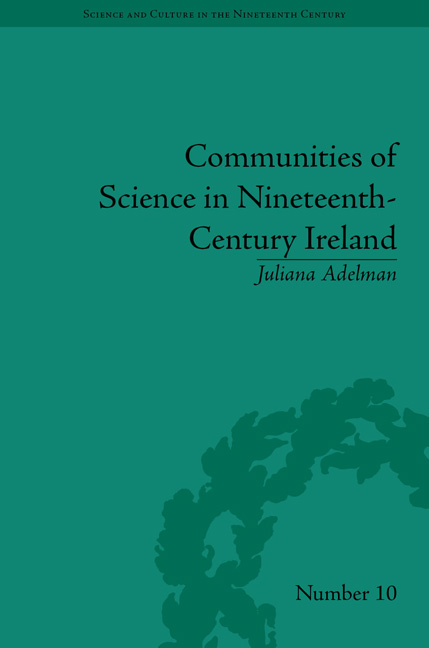Introduction
Summary
Dublin had eminent men of science, but no recognised Irish school. Hamilton, Graves, Lloyd, Robinson, Stokes, and Kane were known wherever science was cultivated, but known as Englishmen.
Charles Gavan DuffyThe importance of science in Irish popular discourse and public culture during the nineteenth century can hardly be overstated. The promotion of scientific ideas and the application of scientific principles and technologies was the impetus for educational institutions, lectures, voluntary societies, periodicals, museums and exhibitions. Irish nationalists, such as Charles Gavan Duffy, hoped that men of science would assume a role in building an Irish cultural and intellectual milieu. Yet the claim of Duffy that Ireland did not have its own school of scientific thought appears, at least on the surface, to have merit. Irish scientific men often looked to Britain, particularly England, as the centre of the scientific community and many Irish institutions were modelled on British counterparts. However, in scientific terms Ireland was not simply England in miniature. This book examines the middle of the nineteenth century, a crucial period for the development of science in Ireland, and asks what values were placed on science in Irish society and how these values were expressed through institutions, activities and publications.
The interplay between government-controlled institutions and ‘indigenous’ scientific organizations in the period 1840 to 1880 permanently changed the Irish scientific landscape. During the 1840s, science was particularly valued as a discourse which could generate economic and social progress; institutions offering scientific education multiplied. By the 1880s, although many institutions had begun as private initiatives, scientific training was almost exclusively in the hands of the government. Through the Queen's Colleges in particular, the British government embraced the idea that science education could be turned to economic benefit. During the 1850s and 1860s similar sentiments were expressed through popular, and privately funded, industrial exhibitions.
- Type
- Chapter
- Information
- Communities of Science in Nineteenth-Century Ireland , pp. 1 - 10Publisher: Pickering & ChattoFirst published in: 2014



